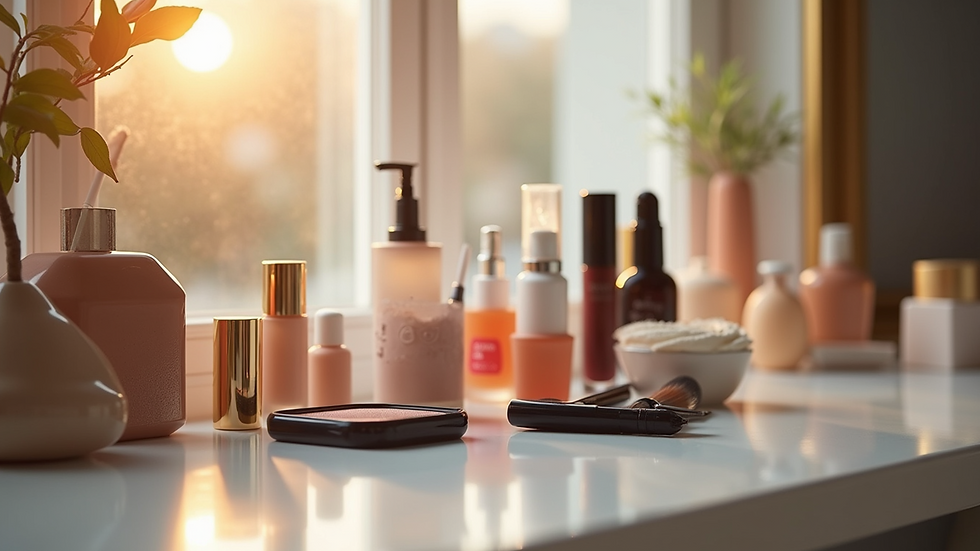Regulatory Requirements for Cosmetics Manufacturers in India
- Rakesh Dwivedi
- Aug 5
- 4 min read
The cosmetics industry in India is expanding rapidly. With a growing number of consumers interested in personal care and beauty products, manufacturers face exciting opportunities. However, they must also navigate a complex web of regulatory requirements to ensure their products are compliant. This post outlines the essential regulations for cosmetics manufacturers in India, providing valuable insights for both new entrants and seasoned players in the field.
Understanding the Legal Framework
The cosmetics industry in India operates under the Drugs and Cosmetics Act, 1940. This legislation aims to ensure that cosmetics sold in the country are safe for consumers and accurately labeled.
In addition, manufacturers must comply with guidelines from the Bureau of Indian Standards (BIS). Adhering to these regulations is critical not just for legal compliance but also for building consumer trust and enhancing brand reputation.
Types of Cosmetics Regulated
Cosmetics in India are categorized by their intended use. Key categories include:
Personal Care Products: Examples include shampoos, conditioners, lotions, and deodorants. Statistics show that the personal care segment is expected to grow by approximately 10% annually, indicating a rising demand.
Makeup Products: This category includes foundations, lipsticks, and eye shadows. Consumer preferences have shifted towards products with natural ingredients, reflecting the demand for safer formulations.
Fragrances: Perfumes and deodorants are part of this group. The fragrance market alone has seen a growth of over 15% in recent years, driven by changing consumer preferences.
Every category has specific requirements based on their ingredients and the potential impact on health.
Registration and Licensing
Before launching their offerings, cosmetics manufacturers must acquire the necessary licenses. The registration process includes the following key steps:
Product Registration: Each cosmetic product must be registered with the Central Drugs Standard Control Organization (CDSCO) prior to marketing.
Manufacturing License: Manufacturers are required to obtain a valid manufacturing license. This involves submitting an application with extensive details about the manufacturing setup and processes.
Labeling Requirements: Labels must display critical information, such as product name, all ingredients, net quantity, and usage instructions. Failure to provide accurate labels can lead to regulatory action.
Additional Documentation
Manufacturers should also prepare essential documentation, which includes:
Stability studies that confirm the product’s shelf life.
Safety and efficacy data that demonstrate the product is safe for consumer use.
Detailed information about manufacturing and testing practices.
These documents are vital for obtaining approvals from the relevant authorities.
Quality Control and Testing
Quality control is fundamental for ensuring product safety and effectiveness. Regulations mandate strict quality control measures, including:
Good Manufacturing Practices (GMP): Adherence to GMP guidelines ensures that products are consistently produced to high standards. For instance, 75% of manufacturers that implement GMP report improved product quality.
Testing for Safety and Efficacy: All products must undergo rigorous testing to ensure they are safe and effective. This includes dermatological and microbial testing. A study found that over 30% of consumers check for safety certifications before making a purchase.
Importance of Compliance
Compliance with quality control measures not only meets regulatory requirements but also fosters consumer trust. Brands that prioritize safety and quality often see higher growth rates compared to non-compliant competitors.
Ingredient Regulations
Cosmetic manufacturers need to be aware of prohibited and restricted ingredients as defined by the Bureau of Indian Standards. Familiarity with this list is essential to avoid legal complications and protect consumer health. For example, certain heavy metals are strictly forbidden in cosmetic formulations.
Natural and Organic Claims
With an increasing demand for natural products, manufacturers must carefully manage claims regarding organic ingredients. Regulations require that any assertions about natural or organic status be supported by credible documentation. As of recent data, 50% of consumers are willing to pay more for products with certified organic claims.
Environmental Considerations
Cosmetics manufacturers must also align with environmental regulations. The Ministry of Environment, Forest and Climate Change oversees compliance, and manufacturers need to consider:
Proper Waste Management: Responsible disposal of manufacturing waste is necessary to mitigate environmental harm.
Sustainable Practices: Implementing sustainable sourcing and packaging practices is increasingly important. Brands that focus on sustainability can capture a growing market, as research indicates that 70% of consumers prefer eco-friendly products.
Importance of Sustainability
Consumers today are becoming more aware of environmental issues. Brands that prioritize sustainability often see increased customer loyalty and can expand their market share. Adhering to environmental regulations also minimizes the risk of fines and legal actions.
Enforcement and Penalties
Non-compliance can lead to significant penalties, such as:
Fines: Manufacturers can face heavy financial penalties for failing to meet regulations, sometimes reaching several lakhs of rupees.
Product Seizure: Regulatory bodies have the authority to confiscate products that do not meet safety standards.
Business Closure: In serious cases, non-compliance can result in the suspension of manufacturing licenses.
It is vital for manufacturers to address these risks proactively. Conducting regular audits and compliance checks can help safeguard against potential issues.

Navigating Regulatory Challenges
Understanding the regulatory landscape is crucial for success in cosmetics manufacturing in India. From securing proper licenses to ensuring product quality, each aspect of compliance plays a role in building a trustworthy brand.
As the cosmetics industry continues to evolve, staying informed about regulatory changes and best practices is essential. Manufacturers who prioritize safety, quality, and compliance are well-positioned for growth in this dynamic market. Ultimately, the foundation of a successful cosmetics business lies in a commitment to meeting regulatory standards while delivering quality products that consumers can trust.




Comments